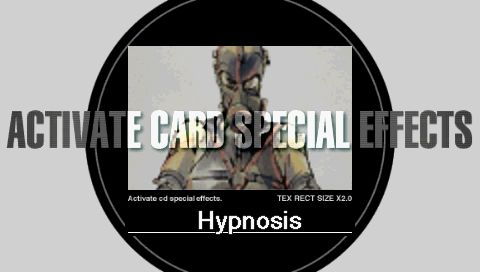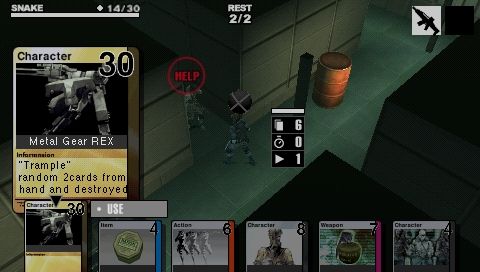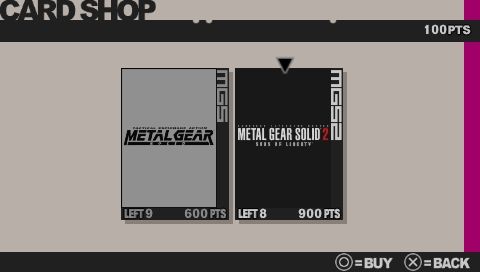Retro Replay Review
Gameplay
Metal Gear Acid reimagines the classic Solid Snake stealth template as a turn‐based card game, carving out an inventive niche within the established series. Each action—moving across a tile, firing your weapon, reloading, or throwing a decoy—corresponds to a card in your deck. Managing this deck becomes as essential as keeping Snake out of sight: overcommit to powerful cards early, and you may find yourself stuck without the tools you need in later stages.
(HEY YOU!! We hope you enjoy! We try not to run ads. So basically, this is a very expensive hobby running this site. Please consider joining us for updates, forums, and more. Network w/ us to make some cash or friends while retro gaming, and you can win some free retro games for posting. Okay, carry on 👍)
The card system rewards forward planning. Before each turn, you choose which cards to draw, which to discard, and which to hold for future use. This “hand management” aspect deepens the tactical experience: do you hold onto silent takedown cards for a tight corridor, or expend them now to clear a minor guard in open terrain? The result is a constant tension between risk and reward, effectively replicating the thrill of infiltration through thoughtful resource allocation.
Enemy AI operates on line‐of‐sight and sound cues, just as in the console entries, but with the added twist of turn phases. You’ll hear the faint beep of a motion detector or see a guard’s vision cone—only to realize you’ve burned all your stealth cards. Combat likewise follows a methodical pace: hit, counter, reposition, and adapt on the fly. It’s slower than real‐time stealth, yet each encounter becomes a mini‐puzzle in disguise, demanding patience and adaptability.
Additionally, Metal Gear Acid introduces map hazards, environmental triggers, and limited‐use items that further complicate the landscape. Every card swap or discarding decision carries weight, as discarded cards may or may not return later. It’s a system that can feel punishing at first, but rewards players who dive deep into deck optimization and scenario planning.
Graphics
On the PSP hardware, Metal Gear Acid punches well above its weight, capturing the gritty ambience of PS2‐era Metal Gear Solid with surprising fidelity. Character models are rendered cleanly, complete with signature bandannas, camo patterns, and expressive facial frames when dialogue bubbles appear. The top‐down isometric perspective shifts the usual 3D camera but manages to maintain the series’ visual identity.
Each level boasts distinctive color palettes and environmental detail, from the sterile white of the aircraft interior to mossy pipework in the underground hangar. Lighting effects—spotlights sweeping corridors, muzzle flares, and flickering security monitors—add to the tension. Card icons and UI elements are crisp and legible, easing quick decision making during your turn.
Card artwork is a highlight: each action card features unique illustrations that range from schematic renderings of weapons to stylized portraits of Snake in action. These cards aren’t just functional, but collectible—and bagging a rare card feels akin to discovering a hidden codec tape. The art direction strikes a balance between utilitarian clarity and the flair fans expect from the Metal Gear franchise.
Cutscenes employ a mix of in‐engine animations and static comic panels, accompanied by voice snippets that punctuate key moments. While not as full‐blown as console cutscenes, they convey the narrative beats effectively without stalling the pace. Altogether, the presentation feels polished and consistent, immersing you in a high‐stakes hijacking scenario despite the hardware constraints.
Story
The narrative thrust of Metal Gear Acid finds Solid Snake dispatched to rescue Senator Hach from unidentified hijackers in 2016. Though the initial premise may seem straightforward—free the hostage, thwart the terrorists—it quickly deepens as whispers of “Pythagoras” emerge. That mysterious code name hints at a conspiracy far larger than a simple hijacking.
Dialogue stands out for its snappy banter and signature Metal Gear quirkiness. Snake’s deadpan observations about card odds, combined with terse exchanges over the codec, keep the tone light even as stakes rise. A handful of new characters—rogue operatives, shadowy handlers, and the menacing terrorist cell—add layers to the plot, each with their own agendas that Snake must unravel.
Plot twists arrive at a steady clip: you’ll question who’s really pulling the strings, and what “Pythagoras” could mean in the grand scheme. While the overarching themes of political manipulation and clandestine warfare echo earlier series entries, Acid manages to carve its own niche by focusing on structured scenarios rather than sprawling infiltration missions.
The story’s pacing complements the level‐by‐level design. Each mission reveals a bit more of the conspiracy, incentivizing you to press on to the next card‐deck challenge. Though it doesn’t reach the operatic heights of Metal Gear Solid 3, it strikes a satisfying balance of intrigue and action that feels appropriate for a portable spin-off.
Overall Experience
Metal Gear Acid stands out as one of the most creative handheld entries in Konami’s stealth catalogue. By merging turn-based strategy with stealth fundamentals, it offers a fresh twist that will appeal to series veterans and card‐game enthusiasts alike. The steady drip of new cards and mechanics keeps the experience engaging throughout its roughly ten‐to‐twelve‐hour runtime.
The learning curve can be steep, particularly if you expect real‐time pacing. Early missions may feel slow as you acclimate to budgeting your hand, but once you master the ebb and flow of card draws and discards, each level becomes a rewarding exercise in foresight. For players craving instant action, the methodical tempo may seem off-putting; but for those open to strategic stealth, it’s a glorious hybrid.
Replayability is bolstered by optional objectives—complete missions within a turn limit, avoid all alerts, or finish with specific cards unused—and the pursuit of rarer, more powerful cards. These side goals not only extend playtime but also drive you to experiment with new deck configurations, ensuring a different approach each run.
In sum, Metal Gear Acid delivers a compelling package: innovative gameplay, solid visual presentation, and a tightly‐woven narrative that leverages the iconic Solid Snake persona. While it may not replace the core console entries, it provides a distinctive, portable Metal Gear experience that stands on its own merits. If you’re intrigued by strategy cards and stealth alike, Acid is well worth a spot in your collection.
 Retro Replay Retro Replay gaming reviews, news, emulation, geek stuff and more!
Retro Replay Retro Replay gaming reviews, news, emulation, geek stuff and more!









Reviews
There are no reviews yet.